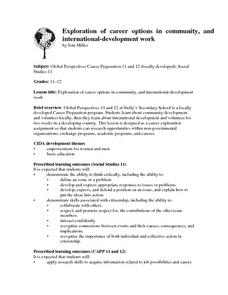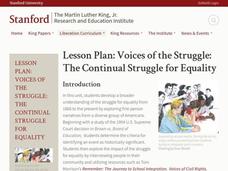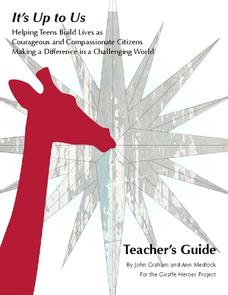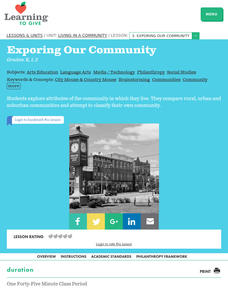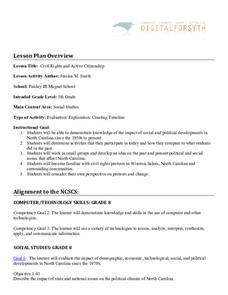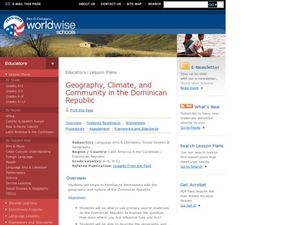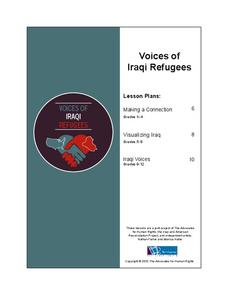Benjamin Franklin Tercentenary
Benjamin Franklin’s Community Contributions
Students research Benjamin Franklin's community contributions. For this social studies lesson plan, students create a collage showing things they can do to improve their communities.
Indian Land Tenure Foundation
A Leadership Chart
It's important for children to understand how they fit into their local or social community. They discuss leadership and who exemplifies a leader in their family, community, and school. Each child will create a quilt square by...
Curated OER
Exploration of Career Options in Community, and International-Development Work
View the video "Global Citizens: Canadians Reaching out to the World" with high schoolers. They will use the internet to locate stories about activism (link provided) and write a summary of each. Additionally they will research careers...
Stanford University
Voices of the Struggle: The Continual Struggle for Equality
As part of a study of the Civil Rights Movement from 1868 to the present, class members examine first person narratives, the Supreme Court case Brown v. Board of Education, and other significant events in civil rights history. They then...
Facing History and Ourselves
Protesting Discrimination in Bristol
Using the Bristol Bus Boycott as a case study, class members examine the strategies and levels of power protesters used to effect change. The two-day instructional activity concludes with individuals reflecting on the actions they might...
iCivics
Students, Engage!
Discuss as a class some problems that you would like to see changed in your school or community, and then take action! After your young citizens determine the appropriate steps they should take to accomplish their objectives, they will...
Giraffe Heroes Project
It’s Up to Us
The Giraffe Heroes Program is designed for teens willing to stick their necks out to make a difference, and to create community service projects that tackle real world problems. The resource guides teens to choose an issue, design a...
Learning to Give
Create a Volunteer Spirit
Motivate young citizens to make a positive difference through volunteering. Scholars examine the local and school community to discover ways the class, as a whole, can volunteer their time to help one or the other, then reflect on their...
Learning for Justice
Change Agents in Our Own Lives
Everyone has the power to change their own lives. Young historians learn how they can become agents for change in their own lives and the community. The lesson focuses on positive role models and what motivates individuals to promote...
iCivics
Step One: We've Got Issues
What is the most pressing issue in your community? The resource helps you and your middle schoolers begin the process of doing something about it! Learners compare and contrast two pressing issues in their local counties by reading two...
Facing History and Ourselves
Responding to Difference
James Berry's poem, "What Do We Do With a Difference?" launches a lesson that asks class members to consider the ways people respond when they encounter someone different from themselves. After analyzing the poem and discussing how they...
Facing History and Ourselves
Reflection and Action for Civic Participation
Slacktivist or activist? Bystander or upstander? Positive social change requires involvement and commitment. After reading a series of articles about young people who chose to get involved, scholars examine a framework that helps peers...
Curated OER
Places in My Community
Students determine the different businesses and buildings in their community. In this community activity, students identify different community locations and their purpose in the community. Afterward, the students collectively sing a...
Curated OER
What Is A Community?
Learners engage in a lesson which introduces the definition of a community and challenges them to explore the characteristics of their own community. This lesson uses the true story of Humphrey the Lost Whale as an illustration of how...
Curated OER
Exporing Our Community
Students explore attributes of the community in which they live. They compare rural, urban and suburban communities and attempt to classify their own community. Each group illustrates their assigned area by drawing buildings, trees,...
Social Media Toolbox
Social Media Survey
Survey says ... social media is here to stay! How do the pupils in your school use social media? Using lesson four from a 16-part series, The Social Media Toolbox, learners study surveys and create their own. The resource includes...
Digital Forsyth
Civil Rights and Active Citizenship
As part of a study of the American Civil Rights movement, class members search the Internet to find important facts, people, events, and pictures that they use to create a timeline of events between 1955 and 1970.
Missouri Department of Elementary
Putting on Armor
Middle schoolers learn how to protect themselves from risky behaviors with a lesson that has them role play several scenarios and demonstrate ways that they might do to stay safe. Class members then use what they have learned to build a...
Missouri Department of Elementary
Safe and Healthy Life Choices (Part I)
As high schoolers seek to grow more and more independent, they must constantly make choices. Some options are healthy and some not so much. To begin the discussion, class members are asked to identify five safe and healthy (or...
US Institute of Peace
Perspectives on Peace
Is peace simply the absence of war, or is there more to the story? Young social scientists define peace in the second installment of a 15-part series. Groups work together to explore cultural concepts of peace and the peacemaking process...
Curated OER
Geography, Climate, and Community in the Dominican Republic
Students familiarize themselves with the geography and culture of the Dominican Republic. For this Dominican Republic lesson, students use the given scenarios as starting points to analyze the geography and culture of the Dominican...
Advocates for Human Rights
Voices of Iraqi Refugees
The stated goal of this resource is to provide learners with basic facts about and build empathy for Iraqi refugees. To do so elementary classes develop a plan for how to welcome refugees to their classroom. Middle schoolers read...
Facing History and Ourselves
How Should We Remember?
We must remember the past in order to avoid its mistakes. Young historians analyze the importance of historical remembrance using primary and secondary documents, as well as video clips. They then study the creation of a World War II...
Curated OER
Lesson: Unmonumental: Final Projects
If you've used any of the New Class Museum lessons exploring the theme, Unmonumental, then check this out! Included are three different final project ideas that tie into the other seven Unmonumental lessons. Kids create community through...




